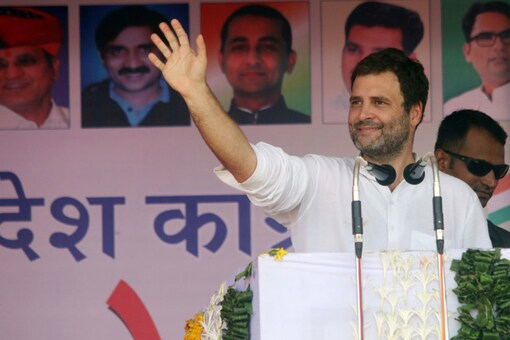
 Source :
Source : When you have reached the bottom, the only way you can go is up. That just about sums up the political prospect of the latest Nehru-Gandhi scion, Rahul Gandhi.
Rahul is expected to take over the reins of the Congress. It’s only a question of when, not if.
That should automatically propel him to the position of leading the opposition in the 2019 general elections. That he is yet to gain the stature of being a prime ministerial candidate is difficult to be contested.
Look at his father, Rajiv Gandhi. He was happily piloting planes and keeping to himself when he was thrust into rough and tumble of Indian politics by his mother. And then the mother was killed and a shocked nation made the son the Prime Minister.
That was over three decades ago. The general servility towards the Nehru-Gandhi family was much more palpable then. Nobody saw anything wrong in the posts of Congress president and Prime Minister transferring from one generation to the other.
Rajiv was Indira Amma’s son and Nehru Chacha’s grandson. He began to find his feet in politics when his naivety, and probably the company he kept, undid him.
He too was killed, the second from the family to be assassinated. Here’s where the dynasty story took a break. Rajiv’s son Rahul, then 21, may have then been thought to be immature to be made Congress chief. Thus began a long wait, which is now 26 years old.
The opposition, specially the BJP, says he is no longer young but still immature.
The social media and the opposition parties have constantly tom-tommed a particular perception of Rahul Gandhi: One who is impetuous, uncaring, lacking political sense and one whose only qualification is his pedigree. The electoral performance of the Congress has not been good enough in the recent past to revise that perception.
We will not know why Rahul’s mother Sonia stepped into Rajiv’s shoes ahead of Rahul. Even in 1991, Sonia commanded enough attention among the senior party leadership that she could have gotten away with anointing Rahul as the heir with her being the “regent”.
In retrospect, Congress insiders would tell you, it was better that she took over the reins, kept the party together, maintained healthy relations with other political parties and steered the Congress through its past highs and present lows.
Recent developments in the party suggest it is time again for handing over the baton. To Rahul? Yes.
Let’s see how this family fared in passing the baton in the past.
Motilal Nehru was Congress president for the first time in 1919. His son Jawaharlal was 30 and entrenched in Congress affairs, but he did not succeed him. Lala Lajpat Rai succeeded Motilal in 1920. The latter took over the party reins once again in 1928 — Mahatma Gandhi became president for a year in 1924 — and Jawaharlal succeeded him in 1929. He was second time ‘lucky’. Jawaharlal’s tenure as Congress chief ended in 1954 — no, it was not a post in perpetuity then — and, no, his daughter Indira did not succeed him. The post instead went to an unheralded Congressman from Saurashtra, UN Dhebar, who remained president till 1959. Indira, like her dad, was second time ‘lucky’, succeeding Dhebar in 1959.
Indira was president only for a year. When Nehru died in 1964, neither he nor his daughter was heading the party. K Kamraj was the president. Indira became Prime Minister in 1966, but she could take control of the party only after another 14 years, in 1978, after Emergency and her electoral defeat. The baton which passed from father Motilal to son Jawaharlal in 1929, skipped the Jawaharlal-Indira succession and passed, for the second time, from Indira to Rajiv in 1985 — after a gap of 56 years! It again skipped the Rajiv-Rahul succession and instead passed on to Sonia only in 1998, after a gap of seven years. Rahul has been waiting for 19 years now.
Returning to Rahul, here’s the minimum admissible truth: Both personal and public life have never, not once, been sympathetic to him. His rivals were always trying to portray him as a kind of a joke, a treatment no other politician in recent years received.
Let’s face it: He was in the public eye when his grandmother was cremated. He then cremated his father. He saw blood in his family for the first time in 1984. Then he saw blood again in 1991, when he was half-orphaned. Thereafter, he was often dismissed as an invisible speck in his mother’s shadow. No comparison of him and his sister ever began without showing him as the inferior sibling. The clamour for Priyanka within the Congress was and is consistent. He was propped up within the party organization by only one person — his mother. Every step he took, dress he wore, word he uttered, was ridiculed. He was caricatured as an unwanted politician. Any talk of dynasty politics, everyone looks at him. The opposition, specially the BJP, proactively promotes this perception of him perhaps to show how puny he is in a world of political giants.
Yet, it must be said in his favour, Rahul is made of tougher mettle. He did not slink away (notwithstanding his inexplicable absences from the country at crucial times). He did not become a psychological wreck. Not much — tweet, poster, joke or cartoon — riles him any longer, at least in public. He clings on.
He may have inadvertently acquired the thick skin required to be a politician. But leadership is not just about sticking around, it’s also about connecting with the people. It remains to be seen if Rahul pulls up a surprise on this front!